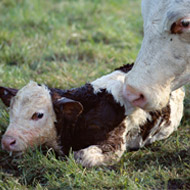New test detects Johne’s disease in day-old calves

The trial proves that early detection of live MAP infection is possible.
Researchers have developed a new diagnostic system that can reliably detect Johne’s disease in the blood of day-old calves.
The Actiphage system, unveiled at the European Association of Veterinary Laboratory Diagnosticians (EAVLD) Congress, can identify live mycobacterial infection in a range of tissue types, including blood and faeces.
Current tests for Johne’s disease only allow the reliable detection of Mycobacterium avium subsp. paratuberculosis (MAP) in 18-24 month calves and are unable to distinguish between active and passive infection.
In a 16-month trial, researchers tested PBD Biotech’s Actiphage Rapid Kit and Biosellal’s Bio-T Kit on calves from three different herds. The calves were born from MAP-positive and MAP negative calves, and the tests were carried out on both blood and faeces samples.
Researchers found that the Actiphage system could identify live MAP infection at least four weeks earlier than the faecal PCR in 75 per cent of cases. In one case, the new diagnostic detected MAP in the blood of a one-day-old calf born from a MAP-positive cow.
Researchers say the trial proves that early detection of live MAP infection is possible, and paves the way for improved Johne’s disease monitoring and control measures on farms.
Co-Author Dr Ben Swift, R&D Director at PBD Biotech, explains, “Young animals are highly susceptible to infection and being able to identify Johne’s disease at this early stage is key to controlling disease spread.
"The trial showed that the sensitivity and specificity of Actiphage enables detection of lower levels of MAP than the current culture methods, and provides results in six hours rather than weeks.”
Claire Pelletier, Directrice Générale of BioDev, consultant to Biosellal, adds: “The study showed that two calves, identified as MAP-positive by Actiphage-PCR on blood during the first monthly sampling didn’t shed MAP into their faeces until 10 and 11 months. This emphasises that early detection provides a short window of time that allow for control of the disease.”



 The Federation of Independent Veterinary Practices (FIVP) has announced a third season of its podcast, Practice Matters.
The Federation of Independent Veterinary Practices (FIVP) has announced a third season of its podcast, Practice Matters.